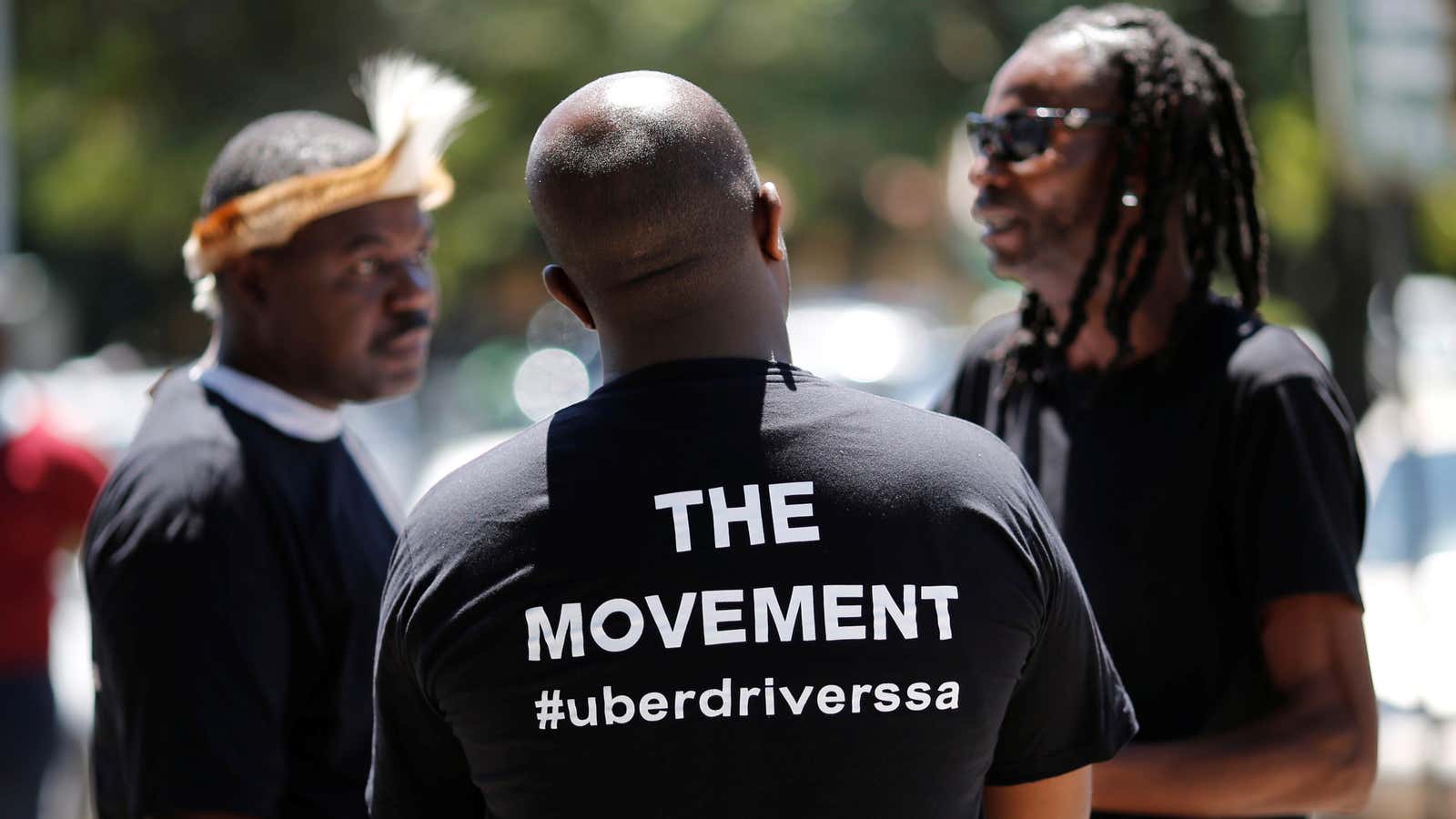Uber is being forced in some countries to provide more employment benefits through court actions and in order to ease tensions with workers and regulators—and drivers in South Africa and Nigeria are taking note.
In February, a group of drivers in South Africa announced plans to file a class action lawsuit against Uber for unpaid overtime and holiday pay. The drivers are hoping for a similar victory to that of their British peers, with the UK Supreme Court in February ruling that Uber must treat drivers as workers, not as self-employed contractors. That entitled drivers to benefits such as minimum wage and paid leave. (The law firm which represented the UK drivers is assisting with the South African lawsuit.)
What’s becoming increasingly clear is that the US-based gig worker model is falling short to that of labor standards in other parts of the world, such as in countries like South Africa, which have a history of unionization and strong worker protections. The tensions could become a hurdle for Uber’s global growth.
“After the London fiasco, Uber cannot put the genie back in the bottle and we expect more regulatory and legal battles in South Africa and across Europe on this hot button issue,” said Dan Ives, an analyst at Los Angeles-based investment firm Wedbush Securities, in a statement to Quartz. “The class action suit in South Africa could slow Uber’s growth plans in the country until this overhang is removed or settled.”
South African Uber drivers are currently classified as self-employed, despite long-standing efforts by drivers for more protections. Drivers in the country face a particularly challenging climate, as they are often targeted with violence and intimidation by meter-cab competitors and the country’s powerful taxi network.
The British law firm Leigh Day and Johannesburg-based peer Mbuyisa Moleele Attorneys said in a statement to Reuters that the case could affect up to 20,000 drivers.
The tension between gig companies and workers is also showing up in other parts of Africa. Last month, a group of Uber drivers in Nigeria said it is working on a class-action lawsuit against ride-hailing companies Uber and Bolt, also citing the UK outcome. The drivers are seeking compensation for unpaid overtime and holiday pay, pensions, and social security, as well as union recognition. (The company faced a similar suit by two Nigerian drivers in 2017.)
The latest action comes as the ride-hailing market in Africa has been expanding, with a proliferation of local startups and international competitors. DiDi Chuxing, a Chinese ride-hailing backed by SoftBank, began operating in Cape Town, South Africa in March. According to the BBC, Uber is present in at least seven African countries and has 150,000 drivers.
Following the UK case, Alexander Colvin, a dean at Cornell’s School of Industrial and Labor Relations, says that it wouldn’t be a “surprise” if the South African courts were to be protective of driver rights and grant workers employment law protections.
How much is at stake for Uber was evident last year, having won on its own turf with Prop 22 in California. Uber along with Lyft, DoorDash, and Instacart spent over $200 billion on a campaign to keep workers classified as independent contractors with limited benefits in one of the largest markets it operates in. But outside of the US, the ride-hailing giant and other gig companies have faced a slew of regulatory battles, particularly, in Europe, the last several years.
In 2018, Uber drivers in Europe became eligible for sick leave and some other health-related benefits. Then in 2020, Foodora workers in Norway formed their first union after a six-week strike. The 600 employees involved demanded higher pay as well as guaranteed compensation for workers’ use of bikes, uniforms, and smartphones.
Uber may have cleared worker classification hurdles in the US, but the global debate on gig worker rights is far from over.
